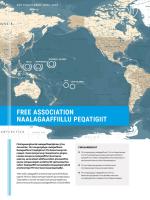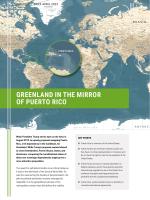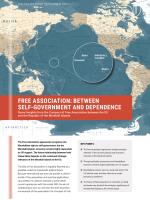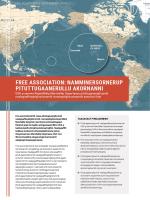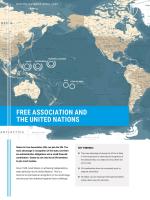Free Association and the United Nations
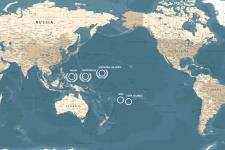
Read in Greenlandic (translation: Tukummeq Maliina Møller-Steffens)
Since 1945, most States, on achieving independence, seek admission to the United Nations. This is a shortcut to international recognition on the world stage and secures their statehood against future challenge.
- The main advantage of joining the UN for a State in Free Association is international recognition of the political entity as a State per se but there are some costs.
- UN membership does not necessarily pivot on separate citizenship.
- FA States can join important international treaties without becoming UN members.
Although in theory States do not require formal recognition from other States to come into existence, it is desirable. Rather than seeking recognition and/or expensive diplomatic relations with dozens of other States, admission to the UN puts to bed any doubts about the nation’s existence as a State once and for all. Membership is available to States in Free Association (FA States).
UN Members each hold a seat on the General Assembly with an equal vote (irrespective of population or economy). The General Assembly controls the UN budget and elects Member States to other major UN bodies (e.g., ECOSOC, Human Rights Council and Security Council). Membership of these bodies allows States to influence UN focus and policy. A small, new Member State may not desire or have the capacity to seek a seat on these bodies directly, but it can engage in “vote-trading” to promote its interests within the broader system. The General Assembly is also a crucial diplomatic forum in which Member States build trust and alliances with
one another.

Responsibilities of Membership
The annual subscription (mandatory contribution to the UN budget) is based on gross national income with adjustments for debt burden and low per capita income adjustments. Andorra and Burundi, both with similar sized economies to Greenland, pay US$140,000 and US$29,000 respectively. The three FA States that are UN members (Marshall Islands, Micronesia and Palau) each contribute under US$30,000 per year. Peacekeeping is funded separately with an adjustment that increases the contributions of the five UN Security Council Permanent Members. States are also encouraged to make voluntary contributions, for example, to the UN Development Programme, the World Health Organisation, human rights treaty bodies and the UN Environmental Programme.
In 1960, the UN General Assembly set forth three options for decolonisation: independence as a sovereign independent State, integration with another independent State, and Free Association with an independent State.
Only five former colonies have opted for Free Association and each has a bespoke relationship with a former colonial power.
Aside from the direct costs, UN Member States maintain permanent missions and/or send delegations to meetings of UN bodies and specialised agencies, primarily in New York, Geneva and Vienna. They also have significant reporting requirements which can amount to an administrative burden for very small States. Every Member State must report to the Security Council Counter-Terrorism Committee on financing of terrorism, weapons of mass destruction, incitement to terrorism and sanctions. They must also report at a five-yearly interval to the Human Rights Council and send a delegation to discuss the report.
Under the Charter, the UN is an open organisation meaning that all States that meet the basic criteria for membership should be permitted to join. Furthermore, the International Court of Justice ruled in 1948 that these conditions were exhaustive; no other criteria are required. Security Council Permanent Members have blocked admission for States based on political considerations (e.g., Palestine and Kosovo) but are unlikely to veto applications from clearly post-colonial FA States.
The Citizenship Question
Of the five current FA States, three are UN members (Marshall Islands, Micronesia and Palau: all in FA with the United States); and two are not UN members (Cook Islands and Niue: in FA with Aotearoa/New Zealand).
The former group of States confer citizenship independently and their citizens are not US citizens (although they have certain rights to live and work in the US); whereas the Peoples of Cook Islands and Niue are full citizens of Aotearoa. Nevertheless, there is nothing in the criteria for admission (above) or precedent to indicate that distinct citizenship is a necessary requirement.
Only States can join the UN, and one criterion is that a State have a “permanent population”. However, that is not synonymous with a distinct citizenship regime. Some British dominions (Australia, Canada, New Zealand and South Africa) joined the League of Nations or UN prior to complete independence, while their population remained British subjects. Pakistan also joined the UN while it shared a common citizenship with the United Kingdom, Australia, India and South Africa. Residents of North(ern) Ireland (constitutionally part of the UK) automatically had dual citizenship on the creation of the Irish Free State in 1922 and their right to dual citizenship was confirmed by the Good Friday Agreement in 1998. This indicates that the definition of People for the purposes of Statehood/UN membership is distinguishable from the criteria of citizenship.
- Membership in the United Nations is open to all other peace-loving states which accept the obligations contained in the present Charter and, in the judgment of the Organization, are able and willing to carry out these obligations.
- The admission of any such state to membership in the United Nations will be effected by a decision of the General Assembly upon the recommendation of the Security Council.
UN Charter 1945, Article 4
Accession to Major Treaties
Irrespective of UN membership, an FA State can join important treaty systems under the UN framework. Membership of the UN automatically includes accession to the Statute of the International Court of Justice but FA States can accede to the Court without becoming UN members with acceptance of the UN Security Council and General Assembly. Parties can bring cases, including against (former) colonial powers. Nauru (then an independent State) acceded to the Statute in 1988 and brought a case against former Trustee Australia in 1989, ten years before joining the UN. The Marshall Islands (an FA State and UN member) brought a case against the US (and eight others) in 2014.

